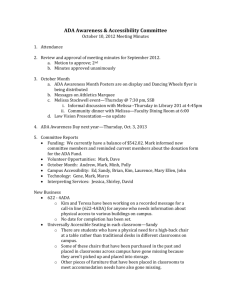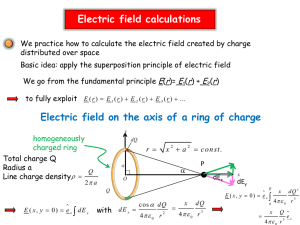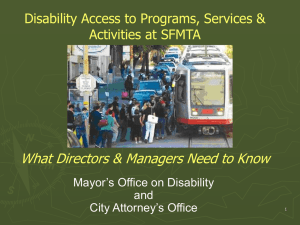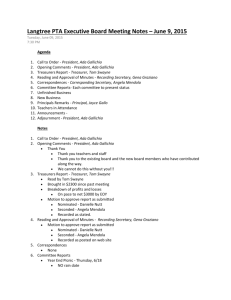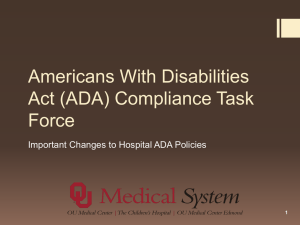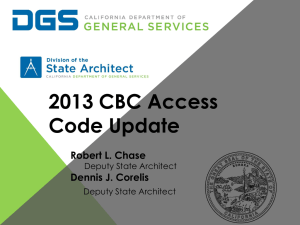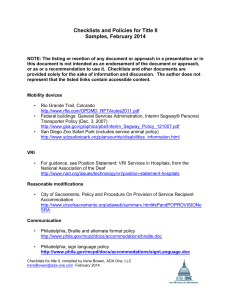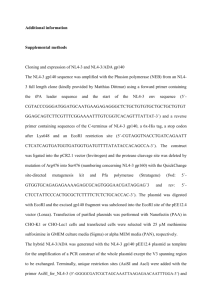Annual Fees Survey and DeIDC
advertisement
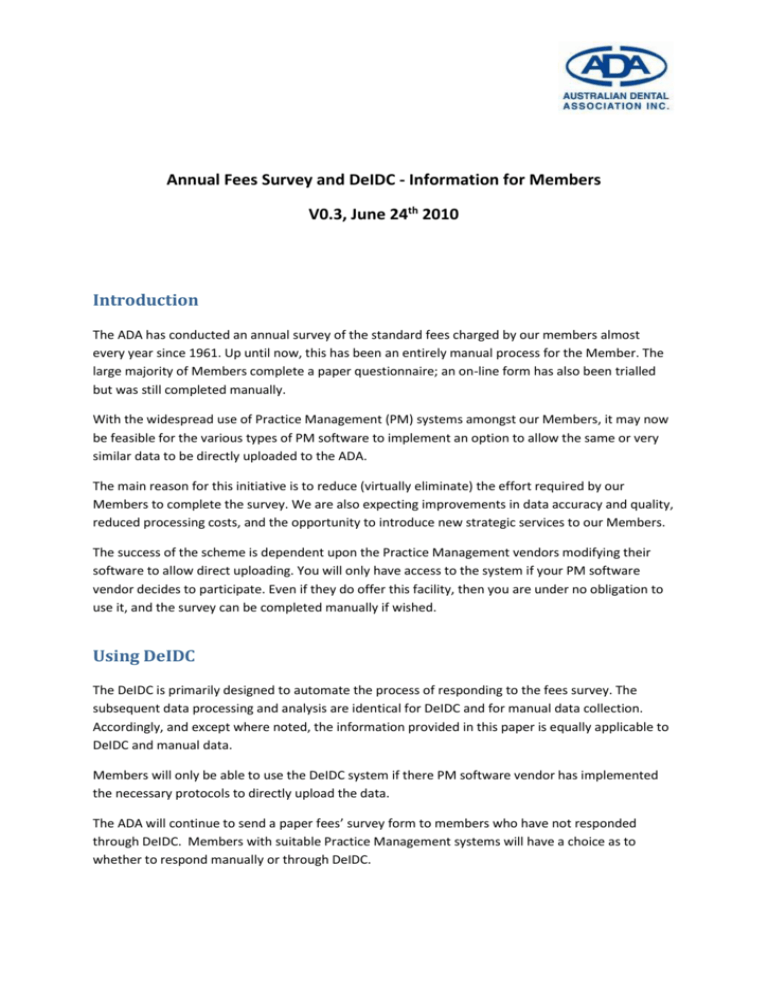
Annual Fees Survey and DeIDC - Information for Members V0.3, June 24th 2010 Introduction The ADA has conducted an annual survey of the standard fees charged by our members almost every year since 1961. Up until now, this has been an entirely manual process for the Member. The large majority of Members complete a paper questionnaire; an on-line form has also been trialled but was still completed manually. With the widespread use of Practice Management (PM) systems amongst our Members, it may now be feasible for the various types of PM software to implement an option to allow the same or very similar data to be directly uploaded to the ADA. The main reason for this initiative is to reduce (virtually eliminate) the effort required by our Members to complete the survey. We are also expecting improvements in data accuracy and quality, reduced processing costs, and the opportunity to introduce new strategic services to our Members. The success of the scheme is dependent upon the Practice Management vendors modifying their software to allow direct uploading. You will only have access to the system if your PM software vendor decides to participate. Even if they do offer this facility, then you are under no obligation to use it, and the survey can be completed manually if wished. Using DeIDC The DeIDC is primarily designed to automate the process of responding to the fees survey. The subsequent data processing and analysis are identical for DeIDC and for manual data collection. Accordingly, and except where noted, the information provided in this paper is equally applicable to DeIDC and manual data. Members will only be able to use the DeIDC system if there PM software vendor has implemented the necessary protocols to directly upload the data. The ADA will continue to send a paper fees’ survey form to members who have not responded through DeIDC. Members with suitable Practice Management systems will have a choice as to whether to respond manually or through DeIDC. If a Member decides to use DeIDC instead of manually completing the survey form, they or their Practice manager must access their PM system and select the option to “Upload survey data”. No data is transferred automatically or without your explicit consent. What is the survey data used for? The survey data is only used for statistical reporting. We do not publish or provide information on individual responses even in de-identified form. Specifically: The data is statistically analysed and used as the basis of the annual fees survey report. This is effectively a public document, as it is distributed to every member of the ADA. From time to time, the ADA uses the data to generate statistical information used in policy development and/or political lobbying. In future, we may also: Prepare statistical reports on the frequencies with which different services (e.g. single tooth extraction) are performed, either as part of the Fees Survey Report or as a separate document. Provide an on-line benchmarking service which allows members to compare their own operating metrics (e.g. costs and types of services provided) against national averages or against “comparable” practices. As described below, no analysis will be conducted against groups containing less than 10 members, ensuring that individual data cannot be extracted from the statistical data. What data is collected, and how is it coded in our database? For a complete list of all data fields contained in the DeIDC survey data, please refer to the formal DeIDC data upload specification available on the ADA website at: www.ada.org.au/filestore/deidc/DeIDC_data_specification.zip Both DeIDC and the manual survey collect the following information: The standard fees for various standard services. The manual survey considers only the 70 or so most commonly provided services; DeIDC extends this to all standard services. As described above, the names of the Dentists who responded is stripped from the dataset and not loaded into the database. Names are used only to “tick-off” members who have responded, such that we can verify that each member has responded. Additionally, the DEIDC electronic survey collects: Information on the relative frequency of different service types/item numbers (e.g. single tooth extraction, etc). This is collected across the Practice as a whole and not by Member. This is all “relative” frequencies; we do not collect information on the actual number of the various services performed over some period. Information used for transmission control and tracking. For example, the DeIDC data file contains the time and date when the data was generated. This allows the ADA to decide which of two uploads from the same Practice was the most recent and hence ignore earlier test transmissions. A secret password key which may later be used by the ADA for the purpose of allowing members to generate customised benchmarking reports as described above. The ADA does not “know” the password for an individual member, and this field cannot be used by the ADA to identify individual member responses. The survey and privacy The survey process implements very strict privacy provisions throughout, from collection to publication of the survey report. In summary: The ADA fully complies with, and in most cases exceeds, the appropriate National Privacy Principles for organisations of our type (i.e. those exceeding $3m pa in turnover and not collecting Health information). We collect information on fees and services purely for the purposes of statistical analysis. No data which can be used to personally identify a respondent, practice etc is held in the database. The ADA undertakes statistical reporting on subsets of the data, for example state-by-state comparisons. These reports are provided to branches and the information conveyed to you through the Branch. The ADA will not provide or publish information on data sets which contain less than 10 Members. The information uploaded does not contain information which could be reverse-engineered to allow financial information such as turnover to be extracted (even if we knew which Member or Practice it related to). No patient or health related information is collected. The DeIDC system does not allow the ADA or any other party to directly access your computer systems in any way. There is no provision for the ADA to “pull” information from your system. Even if it is available, to use DeIDC you must explicitly request that the system uploads the data, and the data which is transferred is very limited. It is as user “push” system, not a central “pull” system. Further Information The following can be contacted for more information: DeIDC specifically: Peter Webb, telephone 0413-737509, email peter.webb@ada.org.au Fees survey in general: Peter Barnard, telephone 02-99064412, email peter.barnard@ada.org.au Privacy in general and other enquiries: Jennifer Murphy, telephone 02-99064412, email Jennifer.murphy@ada.org.au



